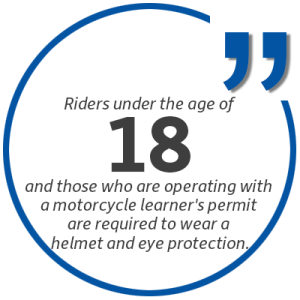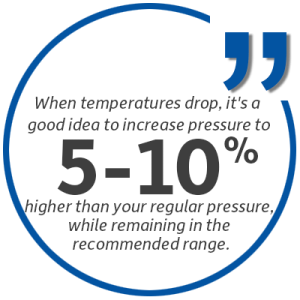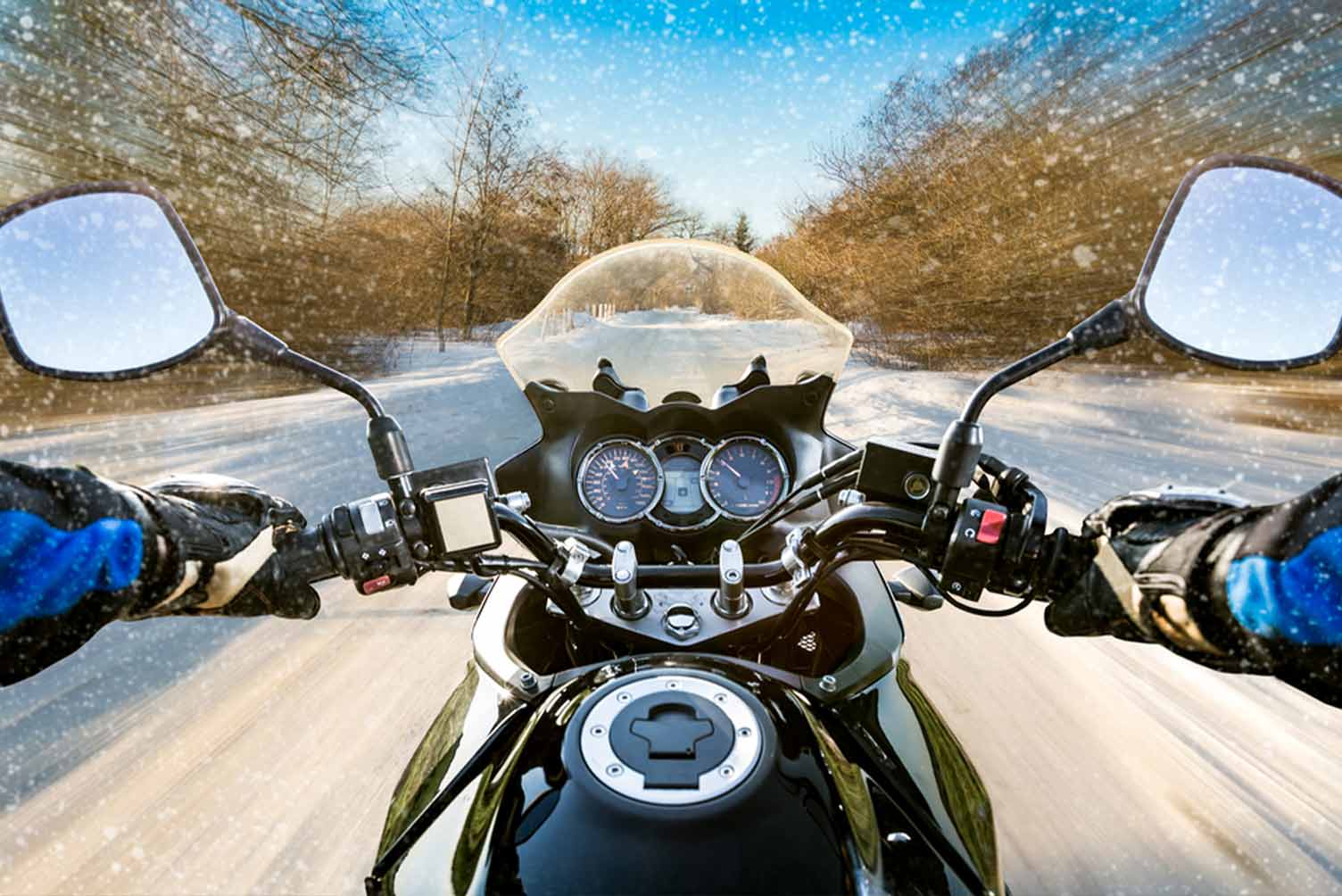Winter is almost upon us. While snowy winter landscapes can make for a beautiful time of year to enjoy a ride in Indiana, it also comes with increased risks. You might be wondering, Can you ride motorcycles in winter? As motorcyclists don’t have the same protections as passengers in a car, they are at higher risk of suffering severe injuries and even death when involved in an accident in the winter.
In 2019, over 5,000 motorcyclists died in traffic accidents. While these crashes can occur any time of year, winter riding is the most risky due to reduced visibility and poor road conditions due to snow and ice. This doesn’t mean motorcyclists can’t ride in the winter, but they should take extra precautions to avoid being injured in a motorcycle accident.
Winter motorcycle riding can be safer when you take precautions, including having the right gear and avoiding potential hazards. In this ultimate guide to riding your motorcycle in the winter, let’s take a look at five ways a motorcycle rider can stay safe on the winter roads, no matter the weather!
1. Always Wear Your Helmet

The number one rule of motorcycle riding is—always wear a helmet. Indiana does not have universal helmet laws, but it is highly recommended for those who want to avoid suffering from severe head injuries that can leave them permanently disabled or even dead. Additionally, riders under the age of 18 and those who are operating with a motorcycle learner’s permit are required to wear a helmet and eye protection.
Not only will a helmet protect you from injury when riding a motorcycle in winter months, but it is an additional layer that can keep your head and face warm in cold weather. When the temperature drops, you will be grateful to have a helmet protecting you from the wind chill!
2. Understand the Risks of Riding in the Winter
Winter riding comes with increased risks and hazards, especially from icy roads. Before riding a bike in winter, it’s essential to mentally prepare yourself for what you may encounter during cold weather riding.
This could include:

- More traffic jams and backups
- Reduced visibility because of snowy conditions
- Slick road conditions from slush, snow, and ice
- Colder temperatures that could affect your dexterity
- Damage to your tires from ice, salt, and other hazards
These are all things to be mindful of and may require you to change your riding habits and be more mindful of your surroundings as you ride.
The main thing to be aware of is that motorcycle riding is always something that requires preparation. Just like you probably protect yourself from heat, sun, and dehydration on a long ride in the summer, you have to take precautions to protect yourself from the unique circumstances of riding in winter conditions.
3. Wear Proper Winter Weather Gear
Speaking of preparation, you have to plan to stay warm!
Riding a motorcycle in winter in Indiana means dealing with frigid temperatures. Sometimes you start the day with decent weather, but the temperature can drop rapidly and you may find yourself in bad weather conditions.
Your winter gear should reflect the cold temperatures you could find yourself riding in. Avoiding frozen fingers, frostbite, and windburn is all about planning ahead and protecting yourself while on the bike.
As motorcyclists’ bodies are exposed to the cold when riding, they are more susceptible to things like windburn and frostbite. Even if you are making a short trip to the store or somewhere else, you never know what could happen. It’s always best to dress as warmly as possible in case you get stuck in traffic, experience a mechanical failure, or run into trouble with your tires or bike.
Proper winter gear can mean the difference between an enjoyable ride and a trip to the ER for frostbite on your nose, toes, or fingers. Any time you don’t have sufficient blood flow to your extremities, you are risking your health as well as your dexterity, which is necessary for riding motorcycles.
The best way to stay warm is to have the right winter gear, including:
- Heated gloves
- Insulated gloves
- Heated vests
- Waterproof gear
- Thermal base layers
- Balaclava or neck warmer
- Winter riding jacket
- Wind protection
Staying warm isn’t just about comfort on a cold day. It is also about safety. Always double check that you have your cold weather gear before a ride.
4. Prepare Your Bike For The Winter
Not only should you ready yourself for winter, but you should get your bike ready as well. Keeping up with bike maintenance is especially important during the winter. The last thing you need is for something to go wrong, leaving you stranded in a snowstorm!

Additionally, you can make changes and updates to your bike for the winter, such as snow tires, a windscreen, handguards, and even heated grips to make your rides safer and more comfortable.
Think about the conditions you may encounter and how your bike can be adjusted for winter riding:
- Wind
- Snow
- Wet weather
- Icy roads
- Cold tires
- Less traction
- Road salt
- Frigid wind chill
- Changes in tire pressure due to temperature changes
There are additional risks to riding motorcycles in the winter, but you can prep your bike to handle the lower temperatures and intense conditions.
5. Don’t Ride in Extreme Winter Weather Conditions
If you are going to ride a motorcycle in winter, you should still avoid riding your bike in severe weather conditions. A ride in a heavy snowstorm, in sleet, or on frozen roads increases your chances of getting into an accident. Black ice can cause you to lose control of your motorcycle, and the extra layers you’re wearing to protect you from the cold may prevent you from having the free movement you need to ride safely and effectively.
Even passenger vehicle drivers are cautioned against driving during winter emergencies. As motorcyclists are even more at risk of injury, it’s best just to stay inside, if possible.
A little bit of snow may be manageable, but stay off the roads if:
- There is a lot of snow accumulating
- The cold temperatures are dangerous
- There is ice or freezing rain the forecast
- Your bike has been experiencing any mechanical issues that may leave you stranded (including brakes, engine troubles, etc.)
Don’t forget to check the forecast before any ride during the winter, especially if the temps are especially cold. Spring will be here soon enough for more pleasant riding!
FAQs About Winter Riding
Let’s take a look at some of the most commonly asked questions about cold weather riding.
Can you ride motorcycles in winter?
Riding on roads covered with freezing rain or snow is extremely hazardous for motorcyclists and should be avoided. The slippery conditions significantly reduce your traction, making it very easy to lose control of your bike. Sudden braking, accelerating, or turning could cause you to skid or lay your bike down. Even if the roads look clear, black ice is a common winter riding threat. So, can you ride motorcycles in winter?
If you absolutely must ride in these conditions, go very slowly, avoid sudden movements, increase your following distance, and be prepared to put your foot down for stability. Even better, consider alternative transportation when roads are icy.
What tire pressure is best for winter riding?

You’ll generally want to keep your tire pressure towards the higher end of the recommended range during winter motorcycle riding. Cold tires can be dangerous. The colder air causes the air pressure inside your tires to drop, and if tire pressure gets too low, you’ll have less stability and traction.
Check your bike’s owner’s manual and tires for the recommended PSI range. When temperatures drop, it’s a good idea to increase pressure to 5-10% higher than your regular pressure, while remaining in the recommended range. You could also invest in tire pressure monitoring sensors to alert you to drops in pressure before they become unsafe.
You may also want to look into snow tires, which are available for motorcycles as well as cars.
How can I improve my visibility when on a winter ride?
Reduced visibility during winter makes it extra important for riders to take steps to see better and be seen by other motorists. Some tips include: wearing brightly colored and reflective gear so you stand out, adding extra LED lights to your motorcycle, using your high beam headlights even during daylight hours, increasing your following distances to improve reaction time, keeping visors and windshields clean of snow/fog, and considering a light-colored or hi-viz headwear to be more noticeable.
Can I still get sunburned if I ride a motorcycle in the winter?
Absolutely. The sun’s UV rays can cause sunburn year-round, even when temperatures are cold. Cold temps don’t mean that you have guaranteed protection from the sun! Make sure to apply sunscreen to any exposed skin like your face. Opt for a minimum SPF 30 waterproof formula. Don’t forget to include your sunscreen in your gear bag.
Wearing tinted eye protection can also protect your eyes from glare and UV rays. The sun can reflect off of snow and cause vision problems.
How can I keep my hands and feet warm while riding in the winter?
If there is one thing that can ruin the fun of riding your bike in the winter, it’s having wet or freezing cold hands and feet!
Heated gloves and insoles can make a huge difference in keeping your extremities warm. Also, don’t forget to wear winter/waterproof boots and consider handlebar muffs. Whenever you’re riding in winter, take breaks to warm up inside, especially if you lose any sensitivity in your feet or hands. It is important to retain as much heat as possible! The more insulation you have to keep you warm on the bike, the more fun your ride will be, because you will be able to avoid unnecessary heat loss.
Chemical hot packs inside your gloves or boots can provide portable heat. Layer socks and switch out immediately if your feet get wet.
What Happens After a Winter Motorcycle Accident?
All motorcycle accidents are serious, no matter when they occur. At Crossen Law Firm, we work with motorcycle riders who have been injured in all kinds of weather, including the cold weather that accompanies Indiana’s winters.
After a motorcycle accident, you may be overwhelmed with medical bills, missed wages, and the challenge of recovering from your injuries. Winter may come and go but leave you coping with the long-term consequences of your accident.
An attorney can help you recover compensation for your injuries if your accident was caused by another party’s negligent actions.
Causes of Winter Motorcycle Accidents
When you go for a winter ride, you can drive safely and obey every rule of the road but still end up getting hurt. That’s because the negligent actions of other drivers or parties could cause you to crash and suffer serious injuries.
Here are some of the ways that someone else’s negligence could cause a motorcycle crash in the winter:
- Driving too fast for the conditions and losing traction
- Failure to clear ice or snow off of a vehicle, creating flying debris and reduced visibility
- Failure to yield the right of way
- Distracted driving, such as texting, eating, using a handheld device
- Drunk driving
- Aggressive/reckless driving
- Failure to share the road
- Unsafe lane changes
- Running red lights/stop signs
- Passing too close
- Unsafe backing up
- Disobeying motorcycle-specific laws
- Failing to clear the roads of dangerous hazards
- Faulty manufacturing, such as bad brakes or cold-damaged parts
Getting Compensation After an Accident
If someone else’s caused your injuries, you deserve compensation. Speaking with an Indianapolis motorcycle accident attorney to make informed decisions about your next steps. A motorcycle rider may be able to get compensation for the following:
- Medical bills and expenses
- Missed wages
- Lost earning capacity
- Permanent disability
- Scarring and disfiguration
- Pain and suffering
- Loss of enjoyment of life
- Loss of consortium
- and more
Consult an Indianapolis Personal Injury Lawyer
Despite following the precautions above, accidents can still happen. If you become injured in a motorcycle accident, the Crossen Law Firm is here for you. Our team is equipped with the knowledge and resources to help you with your injury claim and advocate for your best interests.
To schedule a free consultation with our reliable team, dial (317) 401-8626 today. Or contact us online.

 317-401-8626
317-401-8626 
.jpg)